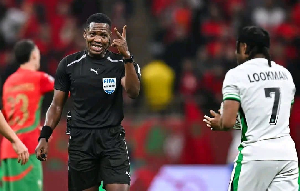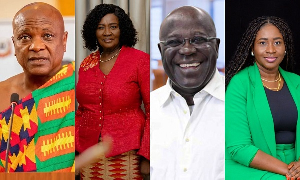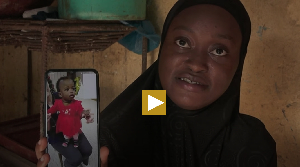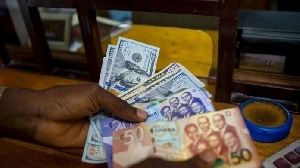... Subversions of State Power and the Public Interest: Lessons in Secular Policy and Administration.
The State shall actively promote the integration of the peoples of Ghana and prohibit discrimination and prejudice on the grounds of place of origin, circumstances of birth, ethnic origin, gender or religion, creed or other beliefs (Constitution of Ghana, Chapter 6(35)(5)) “…The Catholic Bishop of Ho, Most Reverend Francis Lodonu, has said the country was gradually becoming "impure in every aspect of life." "Ghanaians are holy and pure people, let us not sell our birth right for indecent cultures and money." (Ghanaweb, 10 Dec 07)GHANA STATE POLICY ON RELIGION:
The “Directive Principle of State Policy” guarantees a secular state for Ghana and Ghanaians. A secular state is one that recognizes that religion is a private affair and that the public purpose is better served by the Rule of Law, rather than by Rule by Priests or any religious doctrine. This progressive principle is in accord with one of the other lessons of world history – in order to secure progress for all and modernization of the states, religion and its practitioners must lose authority in favor of state government and state power. The Ghanaian Constitution requires neutrality of the state with respect to religion. Therefore, Ghana is not, and cannot be a Christian, a Moslem, a Jewish, a Buddhist, a Shinto, a Hindu, etc, state!! However, in listening to recent statements by public officials and others plying their stock in trade for political office in the public media and airwaves, one gets the impression that Ghana is for one religion or the other. Some of these statements appear regularly on Ghanaweb. Before we go any further, the reader should note that Prof Lungu is only interested in those things said and done in and to the public domain. Prof Lungu is not interested in what preachers and politicians say or do, except where their influence, as preachers and ministers, is manifested in public policy and administration, based on their claim to higher religiosity and relative morality superiority.
Regarding politicians, the last I checked, none of the persons hotly contesting the Presidency was a priest, nor are the many persons currently in public service, in public service because they are preachers. No body in Ghana believes for a minute that all these aspirants and the current leadership, including President Kufour, are “Mother Theresas.” But we’ve been hearing a lot lately about moral decay and indiscipline as the cause of the Ghanaian development conundrum. The code underlying most of these charges are that many Ghanaians are not faithful enough to God and that the government must help indoctrinate little Ghanaian children into religion. In fact, some will go as far as to say that Ghana is a Christian country. Never mind the “perversion” of corruption, bribery, nepotism in government and destitution of basic facilities and amenities all across the country for the masses.
WHICH COUNTRY-WAY, LOUDMOUTHS?
Seems to me some of Ghana’s “political leaders” and aspirants do not know where Ghana ought to go in this new millennium, or how to get “there.” The difficulty with these back to religion sentiments is, these so-called leaders seem to have a warped sense of priority – they think that personal emergencies are public emergencies, and public emergencies personal emergencies. And so they act as if people stranded on a road waiting to board an aircraft (that is long in coming) is a natural disaster. However, when a real Act of God (disaster) occurs, it does not have as much impact on them. It quickly loses meaning to them and so goes any compelling interests to move mountains to assist those people. We are all familiar with last floods in the northern parts of Ghana, the Akosombo Dam and electricity quandary, and others.
ITEM: Prof Lungu is not against the Government assisting people in an emergency they are in part responsible for. But if the government is going to do that, why does not the government’s spokesperson (the Deputy Minister of Interior in this case) tell the people what the public policy is. Why shouldn’t the Deputy Minister of Interior or the Minister himself tell the people that it is not the government’s role, that the government is only assisting in a humanitarian capacity, that even as the government is assisting, the government is seeking out all responsible parties and will charge every pesewa of the cost to those persons, including the travelers, if necessary. Then tell the people how much it will cost and how the German company was selected and why. Come to find out, it was reported a few short days ago that many of the “travelers” were “booked” because of free tickets or seriously reduced ticket prices. (The latest news is 8 have died and 50 have been deported from Saudi Arabia (Ghanaweb, 27 Dec 07)). Do the deported pay back government’s expenditure and who will pay back next, if ever? And who big is the bill?
PRAY FOR WATER & MORE RELIGION - DON’T CRITIQUE OR PLAN:
Take the call a few short weeks ago that Ghanaians should pray for more rain (water) for Akosombo Dam. Why is it that a modern public official (the Energy Minister in this case) in Ghana cannot ask for a coherent plan from the VRA to solve the perennial Akosombo water problem in a concrete way, even as he and other ministers ask people to pray? Must Ghana wait for the next drought by Act by God (emergency), only to give up Akosombo Dam to nature?
Then take a call recently from the mouth of none other than Prof Atta Mills (Ghanaweb 10 Dec) of the NDC and an organization called Nights and Ladies of Marshall (Ghanaweb, 10 Dec 07) of the Catholic Bishops' Conference. The Catholic Bishops' Conference and Prof Mills called for the Ghana Education Service to reintroduce religious and moral indoctrination into public school education curriculum. Why is it that a “learned” Professor does not realize that what he is requesting is in fact against the same Constitution he is so vibrantly “running to uphold?
Does our “learned” Professor not recognize that ethics, civics, history, even geography, and so many other courses taught or teachable in school rooms all have lessons and best objective potential to make students better stewards of the state and of the earth? Is Prof Mills saying that the Ghana Education Service should insert Biblical, Islamic, and other religious texts into the children’s lessons depending on where they live in Ghana, and what their parent prefer? If that is the case, why have a Constitution after all, even if you are the “Royal Opposition”?
And for the Catholic Bishops' Conference, does the Catholic Church recognize the Constitution of the Ghana? Does they Catholic Church advocate and prescribe the same in Rome, in London, in Chicago and Los Angels, in Japan, etc. Is that the public outreach policy of the Vatican for Ghana’s public schools even though Ghana is secular Constitutional Republic? How does one reconcile all that confusion with that statement from our Most Reverend Francis Lodonu, Bishop of Ho, a Catholic, that "Ghanaians are holy and pure people, let us not sell our birth right for indecent cultures and money."
What does that mean? Do Ghanaians love their neighbor more than others and are Ghanaian politicians kinder and gentler, more than other politicians? And what good is a birth right if one lives in abject poverty and illiteracy, without the basic amenities required in this modern age for ones household and community public schools? What is the value of “decent culture” if one cannot get good water to drink or visit the doctor when ones child is sick with simple, curable diseases? What value is a “decent culture” today if a child must sit under a tree in school?
CHIEF IMAN CONDEMNS TITHE “DEFAULTERS”:
Finally, there is the case of Major Sheikh Seidu Adam, Chief Imam of the Ghana Armed Forces. Recently, Major Sheikh Seidu Adam was reported to have “bemoaned the reluctance of Ghanaian Muslims to pay Zakat (tithe), a pillar of Islam, which is an obligation they had to fulfill as adherents of the religion.” On the face, this story looks fairly innocuous until you carefully examine it vis-a-vis the secular policy prescribed by the Constitution of Ghana. In the first place, the GNA report did not state that Major Sheikh Seidu Adam was actually speaking for himself as a private citizen, and not for the Ghana Armed Forces. Prof Lungu does not speak for the Ghana Armed Forces. But rudimentary principles of public administration tells me the Chief Imam of the Ghana Armed Forces cannot be speaking for the Ghana Armed Forces in this case, if one believes in the Constitution. There is a fundamental difference here. Fact is, ministering to soldiers in the Ghana Armed Forces who happen to be Muslims is a professional occupation. He, Major Sheikh Seidu Adam, does not need a tithe to do his job. Therefore, we can safely conclude that he is already paid by the State of Ghana. (We can also assume that other faiths are equally sponsored by, and represented in the Ghana Armed Forces).
Bottom line is this: the Major cannot compel a soldier to pay "Zakat" or warn a soldier in “Fire and Brimstone” fashion that unless the soldier pays Zakat or the Tithe, that they are doomed to eternity. If the Major or any other “Priest” said that, they would actually not be ministering or counseling. They would have entered the world “Judgment.” Judging and condemning others to eternal damnation are not desirable professional activities of any leader, let alone an Imam (Priest) of a first order professional organization. But you can do that in your own private church where it is you who pay the preacher, it is you who pay the rent, it is you who buy the electricity, and it is you who pay the musician, if you have one at your beck and call. Ministering and counseling to professional soldiers is what the Major is paid to do, in addition to his strictly military duties.
CONCLUSIONS ON SEPARATION OF CHURH & STATE:
Separating religion (church) and state (policy and administration) does not mean separating Issah or Mary and their children from their religion (Mosque or Church). Separating religion from state affairs does not mean that Paul or Abu and their children have to stop being religious. Separation of Church and State only means that Issah’s and Mary’s political leaders cannot (and ought not be able to) instruct them and their children in religion. The corollary is that Issah’s and Mary’s religious leaders do not (and ought not to) have political authority over Issah and Mary, and their children.
As a consequence and for the sake of good governance, Ghanaian politicians should concentrate on legislation and policy and leave administration to properly funded professionals and those responsible public agencies, including the Ghana Education Service. It is only in that environment that Ghanaians can thrive and compete in science, technology, scholarship, the arts, and politics, yes, politics, with nations that give more room to individual development, dissent, and self critique. That used to obtain years and year ago, when Ghana was a true leader in education in African. It is only in that environment of self-critique and objectivity that Ghanaians can begin to solve the many development conundrums facing Ghanaians and Africans.
Wishing all and Ghana a Happy and Successful Secular New Year (2008)!!















